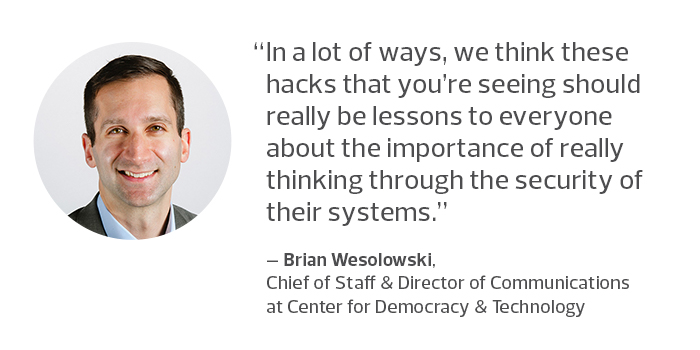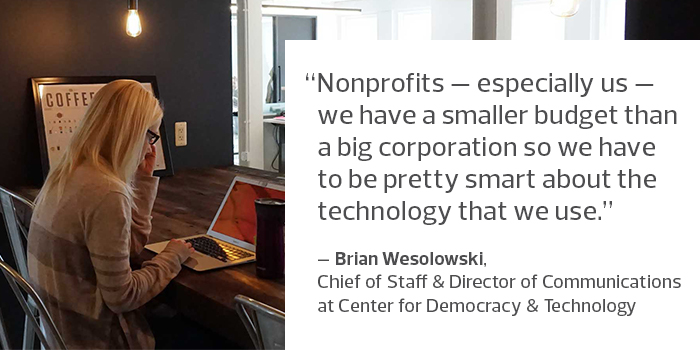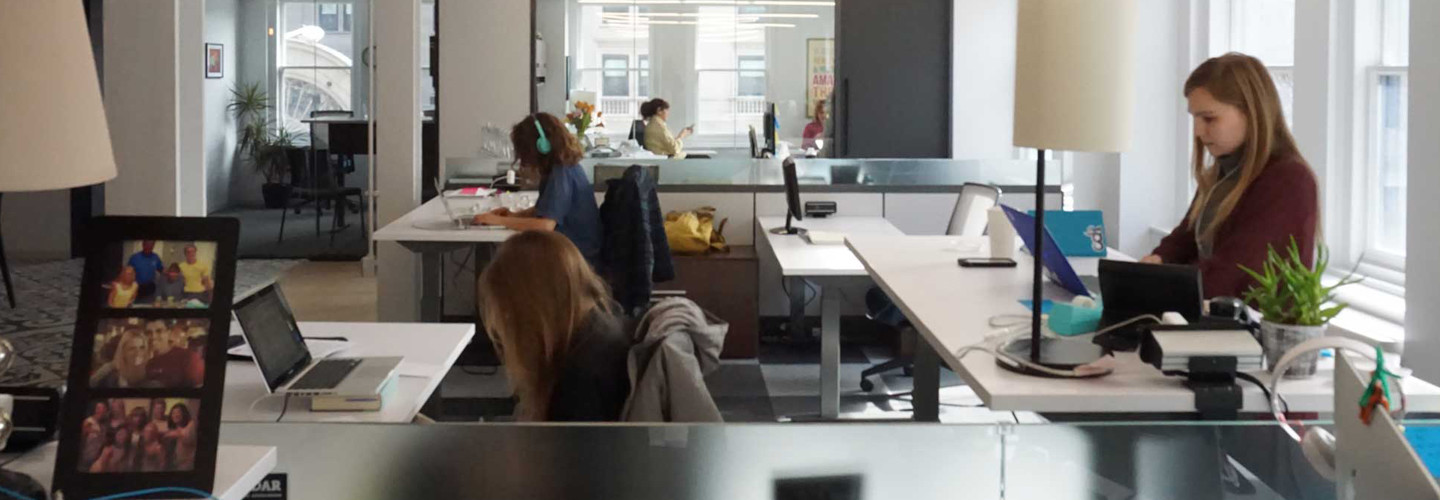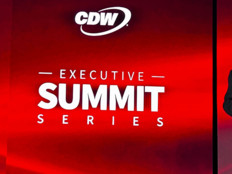Q&A: Brian Wesolowski Places Security and Productivity at the Forefront
The internet is in many ways an untamed jungle. And while there are many aspects of society that have benefited from the laissez-faire policies and practices that have governed the internet to date, there are some organizations that would like to rein it in.
The Center for Democracy & Technology is a voice for user freedom in the ongoing internet policy debates. In the organization’s view, the internet is itself a tool and avenue for democracy; hence, the nonprofit’s name.
The CDT’s blog was selected as one of BizTech’s Must-Read Nonprofit IT Blogs this year, and we followed up with Brian Wesolowski, the organization’s chief of staff and director of communications, to understand how the CDT utilizes technology to support internal operations and spread its message.
BIZTECH: How does the CDT use technology to support its everyday operations?
WESOLOWSKI: We’re not that different from a small business in terms of how we think about the technology that we use. In a lot of ways, nonprofits — especially us — we have a smaller budget than a big corporation, so we have to be pretty smart about the technology that we use.
We’ve actually found some really great solutions. We are on Google Apps, which has been a great thing for us. We have our email there, we use all of their sharing features such as Docs and Sheets. And that has been a great way for us to streamline our work process and decrease the amount of onsite storage we need for things like email.
BIZTECH: What are you using for telework or remote work communications?
WESOLOWSKI: We actually have a presence in San Francisco and Brussels, so we’re not just national, but also international.
We’ve used two different things: We found that for smaller meetings, we really like Google Hangouts quite a bit. It’s been an easy way to get everyone online if we’re doing just a quick meeting. We’re also using Cisco Systems for our phone and for our messaging.

BIZTECH: Is security a big factor for your organization?
WESOLOWSKI: I would say both security and privacy are major factors for us. We’re a mission-driven organization, and one of our main goals is to ensure that the entire internet is secure. So we want to make sure that we are following best practices in any system that we choose, both our internal systems and external systems that we’re using to push out materials.
Whenever we want to use a new system, we have a team here that looks into the security side of it to ask: How secure is it? Are we using the highest standards of encryption?
And then we make sure that if we’re doing any sort of external campaign, where we’re leveraging our lists, that any personal information that we have as an organization is protected. People who interact with CDT trust that we have the highest standards when it comes to privacy and security protection.
BIZTECH: How much did the email hacking of the DNC’s email servers during the election season spark discussion within your organization?
WESOLOWSKI: In a lot of ways, we think these hacks that you’re seeing should really be lessons to everyone about the importance of thinking through the security of their systems.
Internally, every time we have a new IT system that we’re thinking about using, whether it’s big or small, we have these conversations. Everyone should be.
BIZTECH: How big is your staff, and what kind of technology hardware do you equip them with? Does everyone have a notebook or desktop computer? Do you supply them with mobile devices, or is it a bring-your-own-device environment?
WESOLOWSKI: There are 27 people in the organization so we’re relatively small. We are an Apple office, so we supply everyone with a notebook computer. Everyone gets a VoIP-enabled phone, and on the notebooks, we have the Microsoft suite of resources there.
In terms of mobile devices, it is a BYOD environment, and for people it’s an expectation that they use their device. We do offer a stipend to offset that cost.
BIZTECH: Do you have any mobile security in place?
WESOLOWSKI: We require two-factor authentication. So if you take your notebook or smartphone outside of the office, it’s required for any login to our server. That’s on by default now, and it’s required for all our staff.
BIZTECH: What are some technologies you’d like to use in the future that you aren’t using now?
WESOLOWSKI: We’re looking at a better internal system to manage our human resources. There are a lot of platforms out there, but we want to make sure it’s secure. We consider the privacy of our employees vitally important, so we want to make sure if we do go to something that’s more automated that we can access via a portal, that it’s incredibly secure. It’s something our team wants and would hopefully make our chief operating officer’s life easier as well.
We’re certainly looking at putting more things in the cloud and decreasing the amount of storage we have to have onsite as well.

BIZTECH: Given your mission with regard to privacy and security, it seems counterintuitive to move more of your data to the cloud. What’s made your organization so comfortable with shifting to the cloud?
WESOLOWSKI: In a lot of ways, some of these cloud platforms have better security than an onsite server. As these platforms became more common and friendly to businesses, they definitely upped their game with regard to encryption and security. The traffic to and from, the encryption for that, has just been fantastic.
We have a chief technologist, Joe Hall, and an IT manager, Mike Grimes, on staff, and they do one of the most thorough jobs I’ve ever seen of reviewing both the privacy policies and security standards at a very technical level. They provide the most scrutiny to those policies and practices, so once they say go, I’m willing to go.
BIZTECH: Which technology has had the most impact on your organization in the time that you’ve been there?
WESOLOWSKI: I would definitely say our shift to Google Apps. Having a reliable system for our email, it’s just the way communication is now, with the number of people traveling. We have people going to conferences all over the world, so having email that works and is secure is just incredible. We’ve never really had down time, and we switched to Google Apps about two years ago. It’s one of the things I really pushed for early on.
We’re one of the more collaborative organizations that I’ve ever worked for. Everyone has a voice or a say, whether it’s a blog post that’s being done or a paper that’s being written, so that passing back and forth with Word documents via email was an untenable state. It just led to so much cross work. So the move to Google Docs has just been a wonderful thing.
BIZTECH: What is your take on current state of the nonprofit sector when it comes to technology?
WESOLOWSKI: We’ve come a long way since I’ve been communications director here. Sure, I think that sometimes we’re behind on some of it, because of budget issues. That’s always going to be an issue in the nonprofit world. But it’s great to see companies stepping up to offer suites of services and high-quality services to nonprofits like us.








